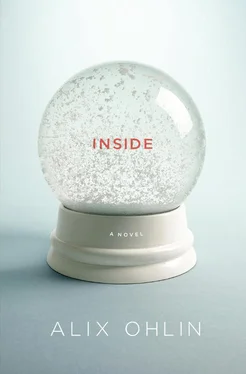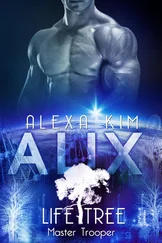The atmosphere felt so serene that he was surprised to notice Grace staring worriedly at her daughter. He knew she was still concerned that the accident had marked her psychologically, but if this were so, the damage was subtle and well concealed. Sarah was lying on her stomach, wearing blue jeans and a white sweatshirt, her legs kicked up in the air. She had pushed her puzzle aside and was reading a book, propping her chin on her hands, her eyes so close to the pages that they were almost crossing. Mitch waited for Grace to scold her — his mother certainly would have — but she didn’t.
“What’s institutionalized ?” Sarah asked. It was clearly an adult book, and Mitch wondered if she should’ve been reading it.
Grace, however, seemed unfazed. “What’s the context?”
“The girl was institutionalized against her will, and she stayed under doctors’ supervision for five years.”
“Okay,” Grace said. “So if it was against her will, what does that imply?”
“That someone else put her somewhere.”
“Good. And if there are doctors there?”
“That the somewhere is like a hospital?”
“Excellent. To be institutionalized is to be placed in a facility, often a hospital, when you can’t care for yourself.”
“My father was institutionalized.”
Mitch looked up. It was the first time he had heard the father mentioned.
“No, he wasn’t, Sarah. He was never institutionalized.”
“But he was sick.”
“That’s right. He was sick, and he died.”
“In a hospital.”
“In a — oh, I see what you mean.” Grace’s tone was very calm. If the subject upset her, she didn’t show it. “Usually, to be institutionalized means in a mental-health facility or a prison, something like that.”
“And my father wasn’t in any of those.”
“No, honey,” Grace said, “he wasn’t.”
Sarah went back to her book. Grace looked up and her eyes skated over Mitch’s. The expression on her face was one he had seen before: part guilt, part pain, part unidentifiable something else. As if she were listening to some inner voice, some call that no one else could hear.
A few minutes later, tiring of the book, Sarah asked Mitch to play with her. Flattered, he got down on his knees, but she shook her head and led him into her room. Holding his hand, she showed him around and explained everything in great detail: her dolls, her schoolbooks, her winter clothes, her summer clothes. She had a collection of seashells she had brought back from a holiday in Prince Edward Island, and another of barrettes that she’d been adding to, she told him very seriously, “her entire life.” She held out a piggy bank and asked him to guess how much it weighed.
“Heavy,” he said. “Maybe five pounds.”
“Lots of money in there,” she said airily. “I’ve been putting it away for a rainy day.”
“Very responsible of you.”
“I’m mature for my age,” she said. “My teacher told Grace. I wasn’t supposed to hear, but I did.”
This was an affectation, he knew, calling her mother by her name, to tell him she was grown up. Was this childish flirting? Certainly it made him uncomfortable. His niece, Emily, was a tomboy, and his nephews were hooligans who cared only about hockey and wrestling. A simple fake-out punch to the gut was all it took to get the ball rolling with those three. It was like playing with a bunch of puppies, all laughter and flung-out limbs. Sarah was a different animal altogether.
“Here,” she said, “look at this.”
On her tiptoes, she pulled a shoebox off a shelf, then sat down on her bed and balanced it on her lap. He sat down next to her, and she opened it with a ceremonial gesture that made clear it was the most important thing in the room.
“What’s this?”
“This,” she whispered, “is the rainy day.”
He couldn’t tell, at first, what it was; it looked like a box of litter and dirt, with some paper envelopes and tiny, shriveled objects nested in tissue.
She took things out one by one and placed them in his hand. “These are seeds for forget-me-nots. These are seeds for daisies. This is a tulip bulb. This is an iris. This is freesia. This is clematis.”
“You’ve got a whole flower garden in here.”
“No. These are just the seeds and bulbs,” she said impatiently. “I save my allowance and buy them from a catalog. Next spring we’re going to plant them in the back. We were going to do it last year but I didn’t have enough money yet. Since my birthday I have enough. And there’s more in the bank. In the summer we can get live plants.”
His hands were overflowing with bulbs and envelopes. She put the box in his lap, and he started placing them carefully back inside.
Then she jumped up off the bed and opened a photo album. “This is what it’s going to look like,” she said, her voice hushed to a stage whisper. “The secret garden.”
There were no photographs inside, just pages cut from magazines, construction-paper drawings, collages, seed catalogs with prices circled. Each page was an explosion of yellow and purple and pink. She had all the names memorized; she wanted to put the daisies next to the irises and the daffodils. She had arranged the garden a thousand times in her mind, she explained, as she flipped the pages for him.
“How did you get so interested in flowers?” he said.
She cocked her head. He thought she was seriously considering how to answer, but it turned out that she was just deciding to ignore the question. After going through all the pages, she put the album away, took the shoebox from him, and replaced it carefully on the shelf.
Then she came back to the bed and scrunched herself up against the wall, with a pillow in her lap. “This is the story,” she said. “There’s a girl, and her parents die, and she has to go live in a big house that belongs to her uncle. But he’s not there. And she finds the key to a secret garden in the back of the house, and she unlocks it and makes all the flowers grow again. And there’s a crippled boy named Colin, and she brings him outside and he learns to walk and the uncle comes back and everybody’s happy and it’s all because of the garden.”
“So that’s why you want to have a garden too?” Mitch said.
Sarah shrugged. “It’s just a notion of mine,” she said.
She came out with these words, these shrugging, adult phrases so out of sync with her age. He supposed it was because she read so much. But it gave her a quality of otherness that, despite her cute blond looks and her obvious intelligence, wasn’t exactly charming. Both she and Grace were a little internal, and together they seemed a closed circle, walled off from everybody else. A secret garden. It made him want to pull them out of the apartment and into the world, make them laugh and run around. Help them be messier. Sillier.
“Think fast!” he said, and grabbed the pillow from her lap.
She reached for it, laughing, craning her arms to get to where he held it, up behind his head. “Give it back!”
“You have to come get it,” he said, holding it higher.
She was bouncing on her bed now, reaching around him, shrieking with laughter and excitement, the seeds and bulbs forgotten now. At last she crawled over his lap, and he let her grab the pillow and hit him over the head with it.
“Oh, you got me,” he said. “You’re too fast.”
“That’s true,” she said modestly, and smiled. “I’m extremely fast.” Then she jumped off the bed and ran out of the room.
An hour or so later, bundling themselves into jackets and hats, they went off to the park. Sarah almost immediately ran into a friend and went off to the swing set with her. But instead of playing on it, they each sat down in a swing and fell deep into conversation.
Читать дальше












